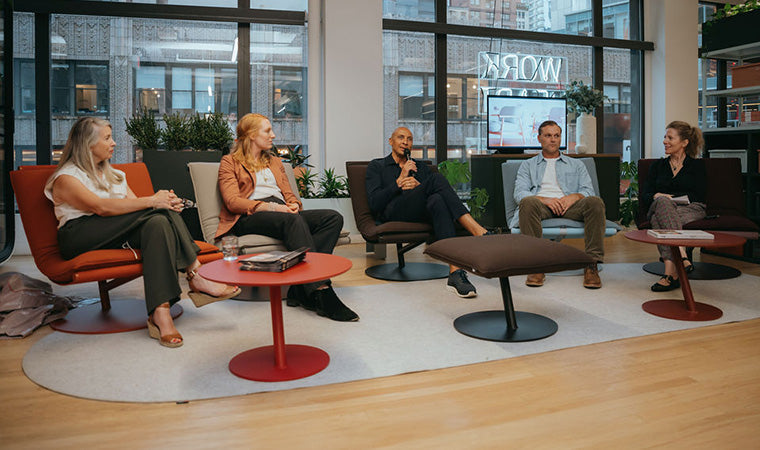Last month, Karen John, CEO of Heartwork, and Natalie Hartkopf, CEO of Hightower, invited Candon Murphy, Firmwide Material Resource Manager at HOK, and Annie Bevan, CEO of Mindful Materials and Parallel Sustainability, to participate in an intimate sustainability panel at NoMad Collab in NYC.
The discussion was a refreshingly honest look at what’s really working (and what isn’t) in the push toward sustainable design. These industry insiders didn’t hold back, and the conversation left us with three big takeaways worth sharing.
1. Collaboration Is the Engine Behind Real Progress
One of the strongest themes of the night: sustainability isn’t a solo sport. Whether you’re a product manufacturer, designer, or investor, making real headway requires partnership, alignment, and a shared language. Tools like the Common Materials Framework (CMF)—which organizes over 150 eco-labels into five clear impact categories—are making that possible by demystifying sustainability metrics and helping stakeholders connect at different levels of understanding.
As Annie Bevan (MindfulMaterials) put it, the industry has evolved from sales pitches to true partnerships—where conversations are less about “convincing” and more about “co-creating.”
2. Transparency Over Perfection: Progress > Greenwashing
The panel tackled greenwashing head-on, with panelists urging everyone to ask tough questions like, “What do you mean by sustainable?” and “Can you back that up?” Third-party certifications still carry weight, but they’re expensive and inaccessible for many smaller brands. So what’s the solution? Recognizing progress—however small—is vital.
Candon Murphy (HOK) reminded us: “Celebrate the VOC certification. Celebrate all of it. And then acknowledge the progress and keep working.” Honest storytelling and transparency, even without the full suite of certifications, build more trust than over-polished claims.

3. Innovation (and AI) Can Help Bridge the Cost Gap
Everyone agreed: the cost and complexity of sustainability certifications—like EPDs and LCAs—can be a huge barrier, especially for small businesses. But that’s where innovation, especially AI, may be a game-changer.
The panel discussed how AI tools could someday streamline the LCA/EPD process, bringing down costs and democratizing access to product-level data. Until then, there’s a clear call for a middle ground—tools that balance rigor with realism to help more companies share their impact credibly and affordably.
Final Word -This event didn’t sugarcoat the reality—sustainability is messy, slow, and often frustrating. But with collaboration, clear communication, and a little help from technology, the industry is moving in the right direction. As Karen John (Heartwork) optimistically noted: “Hope plus action is a revolution.”
Let’s keep going.



